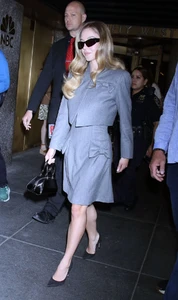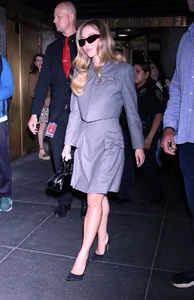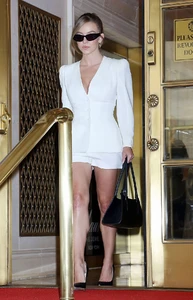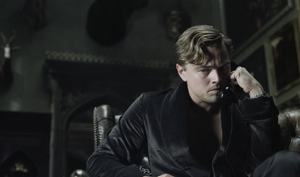
Everything posted by Jade Bahr
- Mia Goth
-
The Hunger Games: Sunrise on the Reaping (2026)
- Tom Blyth
That's tough. Curious who will make it in the end @Lilja K even though I'm not sure I'm into the idea any of them gettin into the struggeling dc universe.- Sydney Sweeney
Love those 3 looks 🥰 Sydney Sweeney heads out in New York, June 5, 2025 Sydney Sweeney heads to The Tonight Show Starring Jimmy Fallon in New York, June 5, 2025 Sydney Sweeney in New York, June 5, 2025- Leonardo DiCaprio - (Please Read First Post Prior to Posting)
Exclusive: Ben Stiller to Direct 'Twilight Zone' Movie for Warner Bros. and Leonardo DiCaprio’s Appian WayTonight, I’ve got a scoop about Ben Stiller coming on to direct WB’s long-gestating Twilight Zone movie, which is being produced by Leonardo DiCaprio. Believe it or not, Leonardo DiCaprio’s Appian Way has been trying to get a “Twilight Zone” movie off the ground for more than 15 years. The project has been a revolving door of writers and directors dating back to 2011, when Matt Reeves, and then Joseph Kosinski, signed on to direct. However, now it looks like it might finally actually happen. According to TheInSneider, Ben Stiller is now attached to direct “The Twilight Zone” for Appian Way and Warner Bros. Stiller has been developing the film quietly for about six months now. It’s currently considered an open writing assignment, meaning the script is still in flux — but the direction is clear: unlike the 1983 anthology film, this new take will focus on one contained story, not multiple shorts. One version of the script reportedly followed a fighter pilot testing a prototype rocket capable of faster-than-light travel, only to find himself 125 years in the future in a utopian society that—shocker—isn’t quite what it seems. Standard Twilight Zone fare: sci-fi premise, philosophical bite. That logline, though, is not final — a new writer could bring in something entirely different. Stiller’s attachment makes sense. He’s a longtime fan of Rod Serling’s original series and has openly cited it as a major influence on “Severance,” his well-reviewed Apple Original series. Stiller has had a fairly fruitful directing — “Zoolander 2” notwithstanding. His credits include “Reality Bites,” “The Cable Guy,” “Zoolander,” “Tropic Thunder” and “The Secret Life of Walter Mitty.”- Leonardo DiCaprio - (Please Read First Post Prior to Posting)
Mine 2 🩷- Sydney Sweeney
@Matt! could imagine worse LOL- Leonardo DiCaprio (GENERAL DISCUSSION)
- The "What Are You Thinking About Right Now?" PIP
Impressive.- Reese Witherspoon
- Leonardo DiCaprio - (Please Read First Post Prior to Posting)
- The "What Are You Thinking About Right Now?" PIP
- Margot Robbie
- Aaron Taylor-Johnson
- Mia Goth
She looked amazing 🖤 Netflix Tudum 2025- Leonardo DiCaprio - (Please Read First Post Prior to Posting)
Martin Scorsese's ‘Midnight Vendetta' Confirmed by Eric Roth Shout out to Jan who uncovered a recent Eric Roth interview, and sent it over. Roth, an Oscar winner, confirms that he’s written a script for Martin Scorsese to potentially direct. I was told it’s called “Midnight Vendetta.” Here’s a rough transcript of what he says about the project: Now, whether this film ever gets made is a whole other story, but it’s definitely something Scorsese is serious about as he’s gone as far as to task Roth to write the script. So, what will be Scorsese’s next film. We know his Hawaii mob crime movie is only supposed to shoot in 2026, according to Dwayne Johnson, and “Sinatra” has most likely been canned. What’s left is “Midnight Vendetta,” “Home,” “Devil in the White City,” and “Life of Jesus,” or he just waits it out until 2026 and shoots the Johnson-starring film.- Theo James
- Brad Pitt
Brad going dirty daddy @Lilja K https://www.gq.com/story/making-of-the-f1-movie-brad-pitt-lewis-hamilton-damson-idris- Jenna Ortega
https://www.harpersbazaar.com/culture/film-tv/a64704219/jenna-ortega-wednesday-interview-2025/- The "What Are You Thinking About Right Now?" PIP
It's pretty rare I agree with critics but in this case I do.- Kevin Costner
Seems like those movies are cursed, what a big mess @Lilja K Kevin Costner Hit With Lawsuit Over Alleged Unscripted Rape Scene on ‘Horizon 2’ Set As if Kevin Costner didn’t already have enough headaches with ‘Horizon’ and its limbo status, another legal mess has now emerged for the actor-filmmaker Stuntwoman Devyn LaBella has filed a lawsuit alleging she was subjected to an unplanned, graphic rape scene on set — without consent, notice, or the presence of a legally required intimacy coordinator. The incident reportedly took place in May 2023 during filming of Chapter 2 of Costner’s self-financed, multi-part Western epic. According to LaBella’s suit, she was brought on to double for actress Ella Hunt in basic stunt sequences, but instead claims she was blindsided by a surprise scene of sexual violence allegedly sprung on her by Costner himself. “This broke me,” LaBella told The Hollywood Reporter. “I was promised safety. Instead, I was exposed and betrayed.” The lawsuit accuses Costner and the production team of sexual harassment, gender discrimination, and fostering a hostile work environment. It also claims LaBella was blacklisted from the Horizon series and from future projects with stunt coordinator Wade Allen after she reported what happened. Per the complaint, the trouble began on May 1, 2023, when LaBella participated in a scheduled, properly choreographed rape scene with full union protocol: rehearsals, breaks, closed set, and an intimacy coordinator present. But the next day, without warning, the suit claims Costner added a second, improvised rape sequence — this time involving a different character and actor, Roger Ivens. LaBella alleges she was asked to lie on a wagon and was only made aware of the scene’s nature once Ivens began physically simulating assault per Costner’s direction. No coordinator. No prior script. And everything reportedly broadcast on open monitors for the crew. Costner’s lawyer, Marty Singer, calls the claims “completely meritless,” asserting the scene was merely a rehearsal with no cameras rolling. He also says LaBella never raised concerns and even gave a “thumbs up” to her stunt coordinator afterward. She was ultimately not used in the final filmed version of the scene. Meanwhile, ‘Horizon’ had already been facing another legal battle before LaBella’s lawsuit was filed — an arbitration claim over alleged breaches in a financing deal with New Line Cinema. The dispute comes amid Costner’s ambitious and personal investment in the ‘Horizon’ project, which he envisioned as a four-part Western saga. While filming on Chapter 3 got shut down last year, due to lack of funds, the uncertain fate of Chapter 2 and the financial and legal tensions surrounding the production have now truly cast doubt on the future of the entire series.- Nicholas "Nick" Hoult
https://www.wonderlandmagazine.com/2025/05/27/david-corenswet-nicholas-hoult/- David Corenswet
https://www.wonderlandmagazine.com/2025/05/27/david-corenswet-nicholas-hoult/- Elisabeth Moss
https://variety.com/2025/tv/news/elisabeth-moss-the-handmaids-tale-finale-interview-1236408717/- The Hunger Games: Sunrise on the Reaping (2026)
- Tom Blyth
Account
Navigation
Search
Configure browser push notifications
Chrome (Android)
- Tap the lock icon next to the address bar.
- Tap Permissions → Notifications.
- Adjust your preference.
Chrome (Desktop)
- Click the padlock icon in the address bar.
- Select Site settings.
- Find Notifications and adjust your preference.
Safari (iOS 16.4+)
- Ensure the site is installed via Add to Home Screen.
- Open Settings App → Notifications.
- Find your app name and adjust your preference.
Safari (macOS)
- Go to Safari → Preferences.
- Click the Websites tab.
- Select Notifications in the sidebar.
- Find this website and adjust your preference.
Edge (Android)
- Tap the lock icon next to the address bar.
- Tap Permissions.
- Find Notifications and adjust your preference.
Edge (Desktop)
- Click the padlock icon in the address bar.
- Click Permissions for this site.
- Find Notifications and adjust your preference.
Firefox (Android)
- Go to Settings → Site permissions.
- Tap Notifications.
- Find this site in the list and adjust your preference.
Firefox (Desktop)
- Open Firefox Settings.
- Search for Notifications.
- Find this site in the list and adjust your preference.












